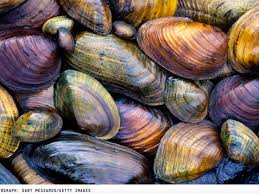A common theme that I have noticed when talking to citizens about water health is the assumption that all mussels in the lake are invasive and a confusion in identification of natural freshwater mussels in Lake Windermere versus the invasive zebra mussels. As a result, there have been piles of freshwater mussels accumulating on nearby beaches. Additionally, there has been removal of mussels that naturally live in this lake by others who assume the mussels are invasive. Such actions, though well intended, can seriously disrupt the ecological balance in this water system in several ways.
The first thing I want to say before continuing this article; there are NO invasive mussels detected in the lake to date.
Zebra mussels are extremely small, typically reaching lengths of 2 to 2.5 cm, roughly the size of a dime. They have distinct zebra stripes and grow together typically in large groups crowding pipes, choking out aquatic plants, and growing on boats. These mussels take over the ecosystem and create a barren underwater landscape.
Contrarily, freshwater mussels are large, about 12cm in length and though they can be found near each other, they do not tend to group or clump together. In Lake Windermere, the mussels we see are called Western Pearlshell, Winged Floater, Western Floater, and Oregon Floater. These native freshwater mussels filter out contaminants from the lake by using their gills to draw water in. As the water is drawn in, particles that can be used for food are digested and other particles that are not used as food remain trapped in the mussel’s gill. Food for mussels includes detritus and different algaes which can help regulate algae growth and prevent eutrophication as well as trap access sediment from the aquatic system. Combined with the ability for a single freshwater mussel to filter about one bathtub worth of water a day, the presence of native mussel species are critical for the survival of an aquatic ecosystem. Lastly, native mussels serve as a food source for both birds and some fish and historically, the mussels in Lake Windermere were also used as a source of food by the First Nations in the area.
However, recreational pressures through activities such as boating, chemical introduction into waterways through certain household and swimming products, drought, elevated water temperatures, and shoreline development all put the freshwater mussels in Lake Windermere at risk. Removal of these mussels by people misidentifying them as invasive species or assuming they are zebra mussels also hurts their populations. Studies at the lake have found a steady decline in freshwater mussel populations over the course of the last few years. If these numbers dwindle low enough, Lake Windermere will become increasingly susceptible to algae blooms, accumulation of contaminants and toxic compounds, as well as witness a dramatic decrease in water quality. This would not only affect the cleanliness of the water we drink from this lake, but it will also lead to an end of most of the recreational activities we like to enjoy in and around this lake including swimming, fishing, and boating.
Therefore, as important as it is to continue to keep invasive zebra mussels out of Lake Windermere, it is equally important to ensure our native freshwater mussels remain in the lake. It is critical to find a balance between tourism and ecological wellbeing and to know how to identify the differences between invasive and freshwater mussels before removing them from a lake. By protecting native freshwater mussels while remaining vigilant against invasive species, we can help preserve the health, biodiversity, and recreational value of Lake Windermere for generations to come. So, the next time you see a mussel inside Lake Windermere, remember, it might not be an invader, but a native ally quietly cleaning the water.
References
Draft – Mussels Scientific Studies. Partnership for the Delaware Estuary. (2023, February 21). https://delawareestuary.org/science-and-research/freshwater-mussels/freshwater-mussels-scientific-studies/
Freshwater mollusc. Government of BC. (2000). https://www2.gov.bc.ca/assets/gov/environment/plants-animals-and-ecosystems/species-ecosystems-at-risk/brochures/freshwater_mollusc.pdf
Freshwater Mussels. (n.d.). https://www.biologicaldiversity.org/campaigns/freshwater_mussels/
Key to Wisconsin Freshwater Snail. (1980). http://northamericanlandsnails.org/wifreshwatersnailskey/wifwsnailkey.html
Mackie, G. (2016, January 30). Conservation status of freshwater gastropods of Canada and the United States. Fisheries. https://www.academia.edu/21238797/Conservation_Status_of_Freshwater_Gastropods_of_Canada_and_the_United_States
Mussels are filter feeders. Science Learning Hub. (n.d.). https://www.sciencelearn.org.nz/videos/366-mussels-are-filter-feeders
Registrelep-Sararegistry. Government of BC. (2003). https://www.registrelep-sararegistry.gc.ca/virtual_sara/files/plans/mp_rocky_mtn_ridged_mussell_0711_eng.pdf

